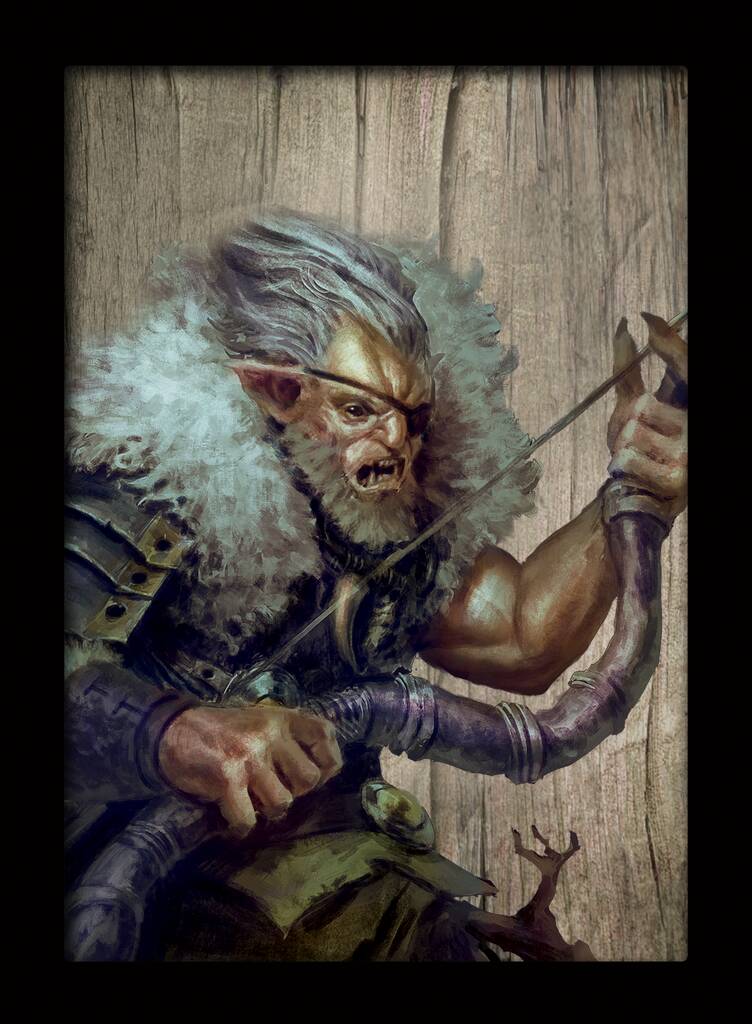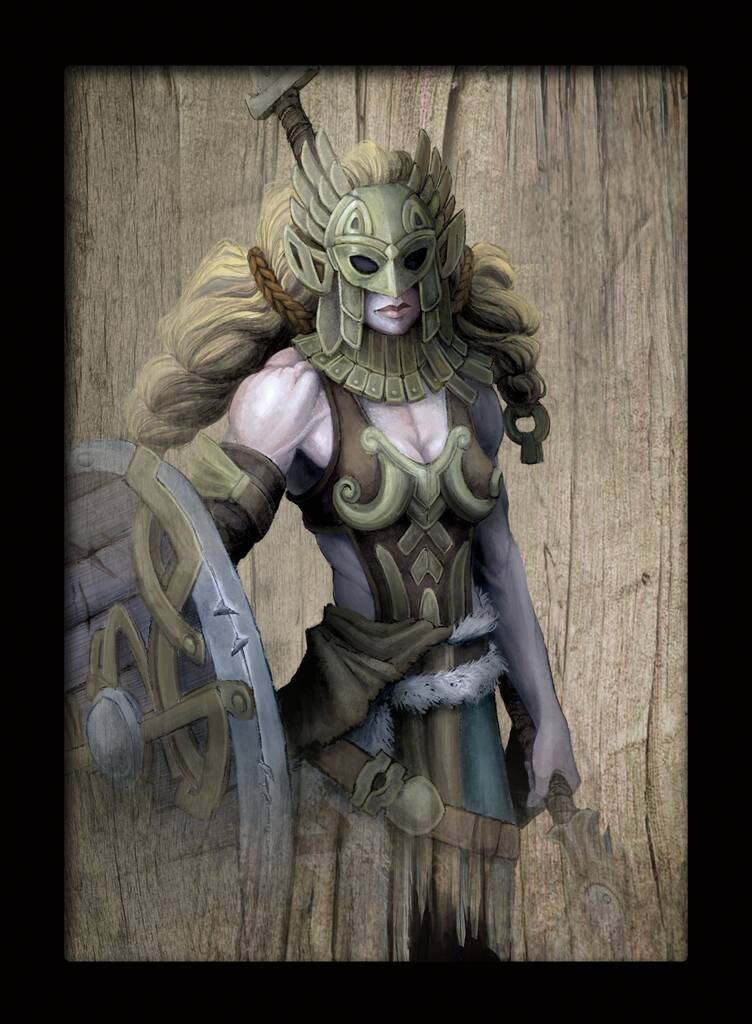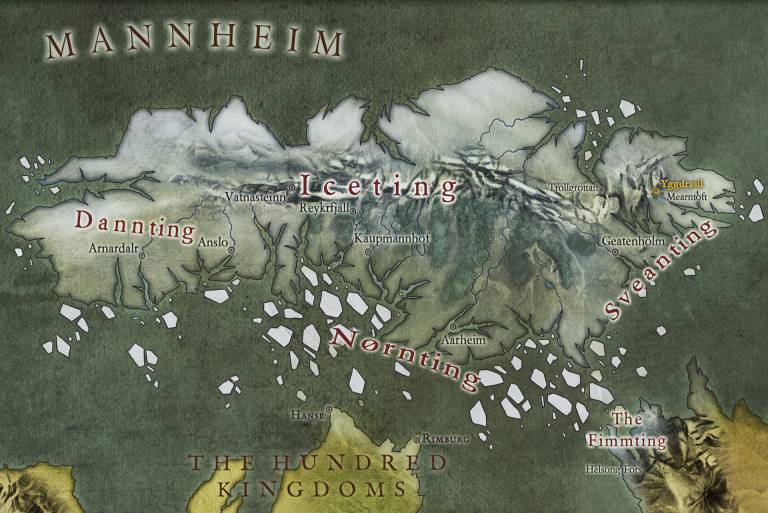Nords

Any man that claims a land must be prepared to be forged in its image. Pay heed. While southerners would claim all that is good and proper in humanity, the Nords have claimed its might, its endurance, and its brutality.
“I know an ash standing, Yggdrasill named, a tall tree bright, its roots holding Vanirheim as one, tying loam with stone. Under its shadow all is warmed, land and heart and mind. Beyond it, true cold reigns o’er all the eye can see; a land dangerous twice over, for predator’s fangs and cold’s claws reign over white on ground and white on trees and white on sea, ‘til Summer comes and golden light reveals.”
– The Old Edda

![]()
Whereas the Hundred Kingdoms and the City States might claim to be the main bastions of human civilization, one should not assume that this means they are the sole concentrations of human might. Far to the north, beyond the monster-infested Northern Seas, lies Manheim, home of the Nords. These people have led a savage and relentless war against their southern cousins; it is a war of raids and plunder, of countless battles and bloodshed, but, above all, it is a war of vengeance.
It would be easy to denigrate the Nords as bloodthirsty beast-spawn, no better than the monsters they lead to battle. To do so would belittle the achievement that crossing the White Wastes represents; it would demean the seamanship, courage, and fortitude required to circumnavigate the continent and wage war on the far-southern shores.
But, above all, it would demean the achievement that survival, let alone dominance, in Mannheim represents. Had the gods themselves created a crucible to test mankind, they could not have crafted a worse hell than the icy lands of the northern continent. This adversity has honed the Nords into one of the toughest and most dangerous foes one can encounter on the field of battle.
The first recorded name for this northern continent is Vanirheim. This is a human name paying tribute to the masters of that age, the Vanir. Very little is known about them and their rule. What little is known is only through a cloud of myth and legend, according to which the Vanir were Gods. Once split by internal strife, they united with their cousins, the Aesir, to cast down the dragons, subjugate their servants and rule over man from their seat of power, Yggdrasil, a vast tree that connected the bowels of the earth to the sky above. They were ruled by a god named Odin and bound by fate to die at Ragnarök. In preparation for this final battle, they selected the most courageous and resourceful of the Nord warriors and took them from their tribes at the moment of their death. When it came, the Vanir’s end, it came in the form of Surtr, a terrible being of light and fire. It had been foretold that Heimdallr, most vigilant of the Vanir, would sound his horn, wake the mortal hosts and herald the beginning of Ragnarök, the twilight of the Vanir.
This never happened.
Loki, the Visionary, the Outcast, the Traitor, struck Heimdallr down before he could marshal the Vanir and their host of warriors, the Einherjar. Thus, throughout Ragnarök, the Einherjar slumbered in their golden halls. Surtr and his fire giants burned the land, razed Yggdrasil, and grew drunk on the blood of gods and men alike before they were cast back at tremendous cost: the power of the Vanir was shattered, and the gods themselves were lost.
In the aftermath of this terrible conflict, the Nords watched in terror as the Jotnar, fierce giants, spawn of Thyrm, Firstborn of Ice and Fire, slowly descended into the wasteland that Ragnarök had left behind. They came from their fastness in the icy peaks to punish humanity for the thousands of years of insult and injury they had suffered at the hands of the Vanir. One by one, the Nord settlements fell, as the Fimbulwinter followed the Jotnar, an unending winter on the land. Man suffered and died under Jotnar rule, populations declined precipitously and extinction loomed. The few that survived did so as slaves to the Jotnar, surviving in caves heated by lava flows at the whim and pleasure of their cruel masters.
Salvation, when it arrived, came from a forgotten place. Through accident or quirk of fate (in which the Nords place such weight), the Einherjar awoke decades too late to fight the battle they had been promised. Of the thousands selected throughout the years by the Vanir, only a fraction awoke. The rest passed away in their sleep or else, some claim, slumber still. Instead of waking up to a glorious battle against their eternal foes, they woke to find their gods dead, their lands a frigid wasteland in which humanity survived only at the whim of the Jotnar. This would not stand.
The untrammeled fury of the Einherjar raged across the icy landscape, sweeping the Jotnar and all their works before them in a tidal wave of blood and savagery, the released slaves at their sides. With the Jotnar defeated, the ice slowly receded, and humanity established itself again in the north under the watchful eye of the Einherjar. Still mindful of their creators, the Einherjar led the surviving Nords as kings, leaders, and seers, denying all claims to divinity, but guiding the Nords once more along the path of the forgotten Vanir, promising that the gods would return. But the gods did not return, and slowly the Einherjar were… lost.
Some simply vanished; others started losing their humanity, devolving into beasts and monsters, often dragging entire tribes in their wake. Others still were lost, challenging those of their kin that had fallen. Today, only a handful of Einherjar remain active, their names and legends guiding the Nords more actively than they ever did in person.
Through all adversities and challenges, the Nords have adapted, learning to endure their environment and co-exist with their fallen Kin. With their hatred and numbers renewed, they keep their vengeful eyes turned to the soft lands of the south, bent on revenge on the children of Surtr, who stole their destiny and their gods.
Mortals, Monsters and everything in between
Mannheim is a land of gods and mortals, of mysticism and steel, of monsters and humans. Saga upon saga have hammered against its frozen land with unrelenting might, forging a history of ferocious clashes for survival and dominance alike.
 Exalted
Exalted Half-Bloods
Half-Bloods Mortals
MortalsExalted
Survival in the frozen lands of Mannheim demands a particular mindset, ruled by the immediate and practical concerns of food and safety. Thus, the Nords have not forgotten the basic tenet for leadership: Power belongs to those who can seize it. While having the blood of a living legend coursing through your veins, granting you strength, speed and power beyond mortal limits, does not grant you the right to leadership, it does make it a lot easier to claim it. As a result, while not all of Nord leaders share the blood of the Einherjar, many do.
Aside from this, leadership in the Nord lands takes a very simple structure. At the very top stands the High King, a position created in the aftermath of the Jotun War recognizing the need to unify the Nord lands to ensure survival. The title is mostly ceremonial, naming a first among equals rather than an Emperor or Overlord. The position is commonly held by Arnbjörn, the Einherjar ruler of Aarheim, but he has relinquished it to challengers who have shown promise before.
Below stand the Konungyr. Each of these men has earned the right to sit at the High Table at the banquets held in Aarheim by the High King. Although little is known regarding the powerful Oath the Jötnar swore to the Einherjar, it is suspected that the power to compel these powerful beings is shared with those present at these gatherings, but it remains hearsay and suspicion. None have dared anger the Einherjar or undermine the Oath by sharing its secrets.
Until they are chosen by the High King, those who would become Konungyr possess almost as many titles as there are leaders themselves. Some claim the title of Kings, others call themselves Jarls, others are called Chieftains, others still would be hard to distinguish from bandit leaders. However, each of these Lords is surrounded by his Chosen Men. While the term refers to one’s personal guard, in reality they are much more than that: bodyguards, friends, vassals and champions. These warbands can display tremendous variation, as each man has been hand-picked by the Lord to reflect his chosen form of warfare.
Half-Bloods
More so than any other culture, myth and history are woven into a single tapestry for the Nords. Their legends still walk among them as living, breathing proof that the myths are very much a part of their lives. But the Einherjar were meant to be powerful, glorious combatants who would save the world in a single, incandescent release of fury on the field of battle. They were never expected to survive, much less breed…
The Half-Bloods are the first, and faintest, shadow cast by the Einherjar: mortal vessels, twisted by the exalted blood they inherited from their divine parents. The descendants of these mighty heroes often inherit portions of their awesome gift, but regretfully lack the control or grace of the parent. Stronger, faster and possessing senses far beyond the ken of mortal men, as children of the blessed Einherjar they should occupy a position of prestige and power… but the truth, like in almost all cases with the Half-Bloods, is somewhat more complicated.
The Ogres possess the strength of ten men, but the intellectual capacity of a small child while the Valdeyr, the Skin-changers, possess the amazing ability to shift into beasts and back, but with none of the control of their ancient forebears. The Stalkers have inherited their keen senses of the greatest of hunters… and find themselves repelled by the scents and sounds of community. Even the Trolls, shunned and feared as they are, were once numbered amongst the great tribes before hardship and impossible choices forced them down a dark path.
It would be easy to differentiate between the Exalted and the Half-Bloods by placing the first closer to the Einherjar’s divine nature and the Half-Bloods closer to their bestial devolution, but this is an unfair oversimplification. The two, after all, walk hand in hand for the Nords. The difference rests not on power or control, but in ambition: should a Half-Bloods individual possess the will to regain control of his gifts he could very well walk in the footsteps of the Einherjar. But whether by choice or simply passive acceptance, the Half-Bloods heed the wild call of their Einherjar blood.
Mortals
Surrounded as they are by the glorious remnants of a bygone age, it is an understandable mistake to discount the threat the mortal populace of Manheim represents. This would be a mistake, almost invariably a fatal one. These are a people who have survived Ragnarök, the Twilight of the Gods, the Fimbülwinter that followed and the Rule of the Jötnar. Mere survival in Manheim is an accomplishment and when one faces Nord raiders, one does not face those who merely survived, but those who thrived.
Each year, hopeful youths gather at Aarheim or one of the lesser coastal settlements for a spot on the long ships. Competition is fierce, but seldom lethal, as manpower and healthy workers are always in demand in the harsh Nord lands. Those that succeed are rewarded with one of the few chances at advancement in the North: raiding.
While a single successful raid can see all of the crew return wealthy enough to support the entire community for years, a successful series of raids can find a humble raider chosen by his liege to join his Huskarls. Huskarls, and their families, need not toil for survival. Their sword arms and discipline are in such high demand their lords see to all their needs allowing Huskarls to spend their time training and sparring, making them a formidable force on the battlefield.
Particularly successful and ambitious Huskarls often rise to the rank of Jarl themselves, employing Huskarls of their own to protect their lands and property. From there, they are only a single deed away from being recognized by the High King and joining the ranks of the Nord Konungyr at the High Table in Aarheim…
Deeper in the shadows, often hidden behind misdirection and bodyguards, walk the Shamen and Volvas of the North. The Shamen are powerful figures whose auguries can send the raiding fleets hurtling across the icy expanse of the White Wastes. The Volvas have been preaching the divinity of the Einherjar to all who will listen and their cults have been growing steadily despite fierce opposition from the very objects of their reverence. Relegated to advisory roles, their words and workings are seldom ignored by those in power, for their influence plays a pivotal role in the motivation and guidance of the Nord war hosts.

































